SSDI Lawsuit: How SSDI Lawyers Ensure Fair Benefits
- Last Updated: January 15th, 2026

Attorney Jessica Paluch-Hoerman, founder of TruLaw, has over 28 years of experience as a personal injury and mass tort attorney, and previously worked as an international tax attorney at Deloitte. Jessie collaborates with attorneys nationwide — enabling her to share reliable, up-to-date legal information with our readers.
Legally Reviewed
This article has been written and reviewed for legal accuracy and clarity by the team of writers and legal experts at TruLaw and is as accurate as possible. This content should not be taken as legal advice from an attorney. If you would like to learn more about our owner and experienced injury lawyer, Jessie Paluch, you can do so here.
Fact-Checked
TruLaw does everything possible to make sure the information in this article is up to date and accurate. If you need specific legal advice about your case, contact us by using the chat on the bottom of this page. This article should not be taken as advice from an attorney.
Key takeaways:
- SSDI lawyers are vital for ensuring you meet the strict eligibility requirements of Social Security Disability Insurance and guide you through complex legal challenges.
- Legal experts from TruLaw can assist in differentiating between types of compensation to avoid a reduction in your SSDI benefits, especially when dealing with lump-sum settlements from personal injury lawsuits.
- If necessary, a skilled lawyer will guide clients through strategic negotiations and appeals, advocating for their rights to fair benefits.
SSDI Lawsuit: How SSDI Lawyers Ensure Fair Benefits
Question: How do SSDI Lawyers ensure fair benefits?
Answer: SSDI lawyers ensure fair benefits in the SSDI lawsuit by guiding clients through the process of applying for Social Security Disability Insurance (SSDI), helping gather relevant medical evidence, representing clients in court, and assisting in appealing denied claims.
Intro to the SSDI Lawsuit
On this page, we’ll discuss this question in further depth, an overview of the SSDI lawsuit, the impacts of an SSDI lawyer, and much more.
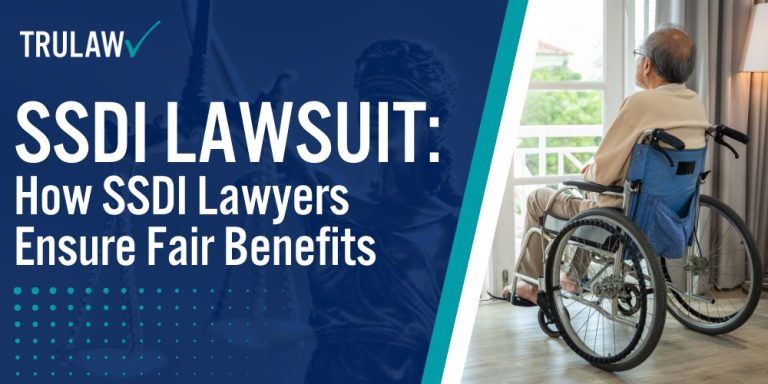
Social Security Disability Insurance (SSDI) is a federal insurance program that provides benefits to people who are unable to work due to a disability.
Consulting with a legal expert is advisable for personalized guidance and to optimize benefit arrangements.
Don’t let confusion about workers’ compensation settlements or worries over your employment history delay your claim any longer.
If you or a loved one are filing an SSDI application or appeal, contact TruLaw today using the chat on this page to receive an instant case evaluation.
Discover how TruLaw’s SSDI Lawyers can help you today.
Table of Contents
How SSDI Lawyers Ensure Fair Benefits
Social Security Disability Insurance (SSDI) stands as a lifeline for individuals who are unable to work due to severe, long-term disabilities.
Eligibility hinges on having worked sufficient years in jobs covered by Social Security and having a medical condition that meets the strict definition of disability under Social Security standards.
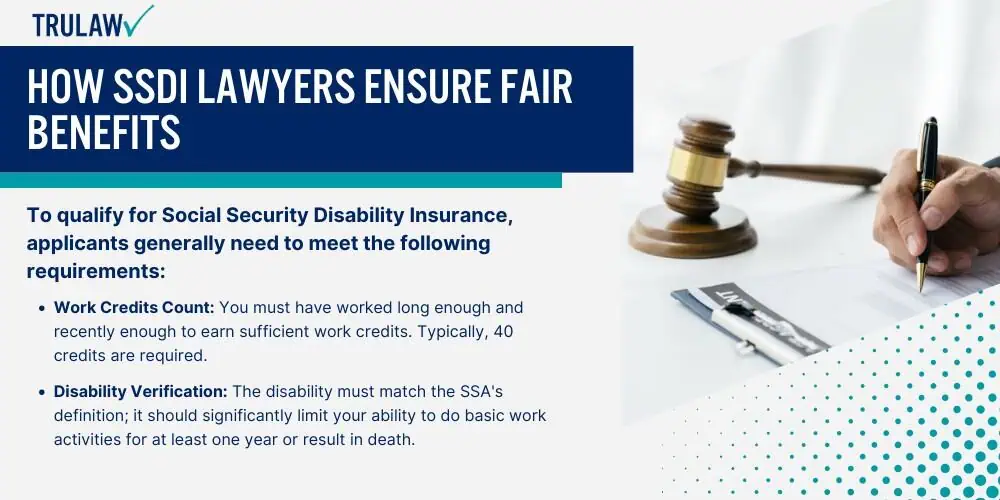
Overview of Social Security Disability Insurance (SSDI)
Securing SSDI benefits can be extensive, often requiring detailed documentation and adherence to specific legal criteria outlined in the Social Security Disability Benefits Reform Act of 1984.
Beneficiaries must prove their inability to engage in any substantial gainful activity because of a medically determinable physical or mental impairment expected to last at least one year or result in death.
SSDI’s impact on people’s lives is immense, offering financial relief recognition and validation for those whose conditions dramatically alter their capacity for regular work.
Social Security Disability Benefits
Social Security Disability Benefits provide crucial financial support for individuals who cannot work due to a long-term disability.
The Social Security Act requires these benefits for those with sufficient employment history and qualifying disabilities, ensuring a safety net is in place.
Monthly cash benefits from SSDI help cover living expenses, medical costs, and other necessities for nonelderly disabled persons.
To receive SSDI benefits, one must have worked in jobs covered by Social Security and have a medical condition that meets the strict definition of disability under the act.
This helps differentiate SSDI from other forms of assistance, such as workers’ compensation or SSI, which cater to different needs like temporary injuries or financial aid based on income resources.
SSDI benefits are a form of income replacement for those who paid into the system but can no longer continue their employment due to severe health issues.
Eligibility Requirements for SSDI Benefits
Qualifying for Social Security Disability Insurance requires meeting specific criteria set by the Social Security Administration.
Applicants must demonstrate a work history and a medically recognized disability.
To qualify for Social Security Disability Insurance, applicants generally need to meet the following requirements:
- Work Credits Count: You must have worked long enough and recently enough to earn sufficient work credits. Typically, 40 credits are required, half of which should be from the last 10 years ending with the year you became disabled.
- Disability Verification: The disability must match the SSA’s definition; it should significantly limit your ability to do basic work activities for at least one year or result in death.
- Age Consideration: Individuals over 31 need 20 credits earned in the last 10 years before disability onset. Younger workers may qualify with fewer credits.
- Recent Work Test: This checks if you have worked close enough to your claim time. For example, if you’re between age 31 and 42, you’ll need at least five years of work out of the ten-year period ending with the quarter your disability began.
- Medical Documentation: Adequate evidence from healthcare providers is essential to prove that your condition impedes your capacity to perform any substantial gainful activity (SGA).
- Income Limits: Earning more than a certain amount monthly generally signifies that you’re not considered disabled under SSDI rules.
- Unmarried Status Requirement: For adults applying for SSDI on their own work record, being unmarried is part of the eligibility criteria.
- Concurrent Benefit Eligibility: There’s potential for concurrent benefits from both SSDI and SSI if you satisfy the requirements for both programs due to limited income and resources.
- Duration of Disability: The disabling condition must either be expected to last at least one year or result in death.
If you or a loved one are filing an SSDI application or appeal, contact TruLaw today using the chat on this page to receive an instant case evaluation.
Role of SSDI Lawyers
SSDI Lawyers play an important role in disability law, ensuring clients receive the fair benefits they deserve.
They provide expert assistance at every turn, from precise application guidance to robust representation during appeals.
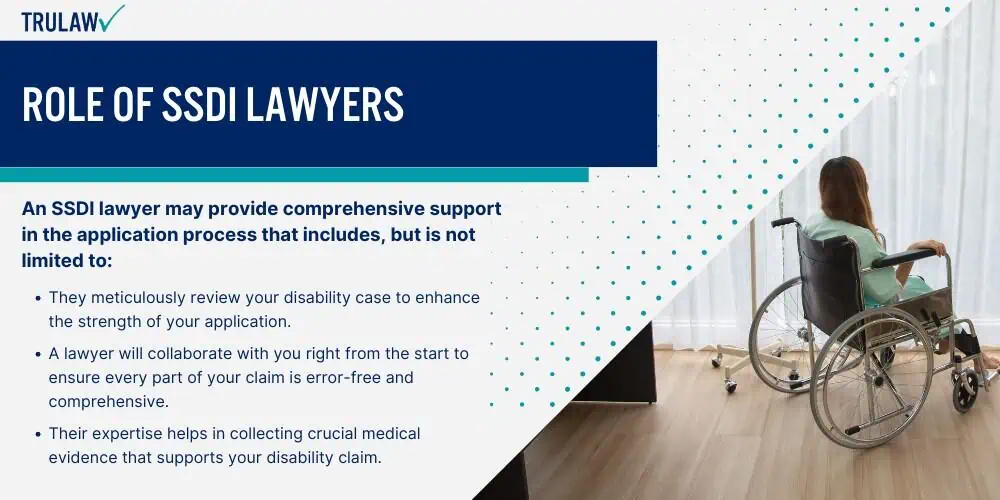
Application Guidance and Completion
Understanding the intricacies of Social Security Disability Insurance can be challenging.
SSDI lawyers from TruLaw provide instrumental support in accurately completing your application.
An SSDI lawyer may provide comprehensive support in the application process that includes, but is not limited to:
- They meticulously review your disability case to enhance the strength of your application.
- A lawyer will collaborate with you right from the start to ensure every part of your claim is error-free and comprehensive.
- Their expertise helps in collecting crucial medical evidence that supports your disability claim.
- Guidance is provided on how to document your qualifying disability, work history, and other vital eligibility information accurately.
- Attorneys advise on avoiding common pitfalls that could potentially delay or derail your SSDI application process.
- They emphasize organizing documents systematically for a straightforward review process by the Social Security Administration (SSA).
- Your lawyer ensures all relevant facts about your medical condition and its impact on your employment capabilities are effectively communicated.
- TruLaw specialists keep track of deadlines and procedural requirements to maintain a smooth flow throughout the application phase.
- They assist in identifying and including exempt resources so as not to affect supplementary programs like Supplemental Security Income (SSI).
- Legal advice includes a plan for managing settlement funds in a way that does not compromise ongoing or future SSDI payments.
Building a Strong SSDI Lawsuit
A strong SSDI lawsuit can mean the difference between receiving fair benefits or walking away empty-handed.
The following steps can aid in building a strong SSDI lawsuit:
- Start with meticulous application guidance: TruLaw attorneys help clients fill out their SSDI applications accurately and completely, ensuring no crucial information is missed.
- Gather comprehensive medical evidence: Compile all relevant medical records and test results to support the disability claim.
- Secure expert testimony: When necessary, providing compelling testimony regarding the extent of a victim’s disabilities.
- Analyze employment history thoroughly: A person’s work history is crucial in an SSDI case. Attorneys review this in detail to establish the impact of the disability on earning capacity.
- Develop a legal strategy tailored to each case: Every SSDI lawsuit has unique aspects, and attorneys at TruLaw customize their approach accordingly.
- Engage in rigorous negotiation tactics: Should negotiations be required, experienced lawyers fight relentlessly for fair settlement amounts.
Negotiating and Appealing
Expert lawyers at TruLaw carefully prepare each case to handle the complexities of SSDI claims for their clients.
Key stages of the SSDI lawsuit negotiations and appeals process include, but are not limited to:
- Accurate Application Review: Before beginning negotiations or appeals, our lawyers meticulously review your initial application for any inaccuracies or missing information that could strengthen your case.
- Evidence Gathering: We collect comprehensive medical records and employment history to build a robust argument for your disability claim.
- Strategic Negotiations: Our legal team engages with the Social Security Administration (SSA) on your behalf, striving to negotiate the maximum possible benefits without compromising future payments.
- Settlement Analysis: If you receive a personal injury settlement, we’ll analyze how it might affect social security disability and work towards minimizing any negative impact.
- Appeal Representation: Should your application be unfairly denied, our attorneys will represent you at appeal hearings, presenting a persuasive case backed by evidence and expert testimony.
- Expert Guidance: Throughout the negotiation and appeal process, you’ll benefit from personalized advice on managing lump sum settlements while protecting ongoing SSI benefits.
- Legal Advocacy: Faced with discrimination or violations related to disability claims? Our lawyers advocate tirelessly to protect your rights in federal court.
- Continuous Support: Even after securing a settlement or winning an appeal, we continue to offer guidance on managing financial resources, including how settlement proceeds spending can disrupt SSI eligibility.
If you or a loved one are filing an SSDI application or appeal, contact TruLaw today using the chat on this page to receive an instant case evaluation.
Effects of a Settlement on SSDI Benefits
These financial settlements can alter the amount one receives from SSDI, necessitating a thorough understanding of their implications.
It’s essential for beneficiaries to be aware of how these settlements interact with SSDI rules and guidelines, especially with the recent changes in 2023.
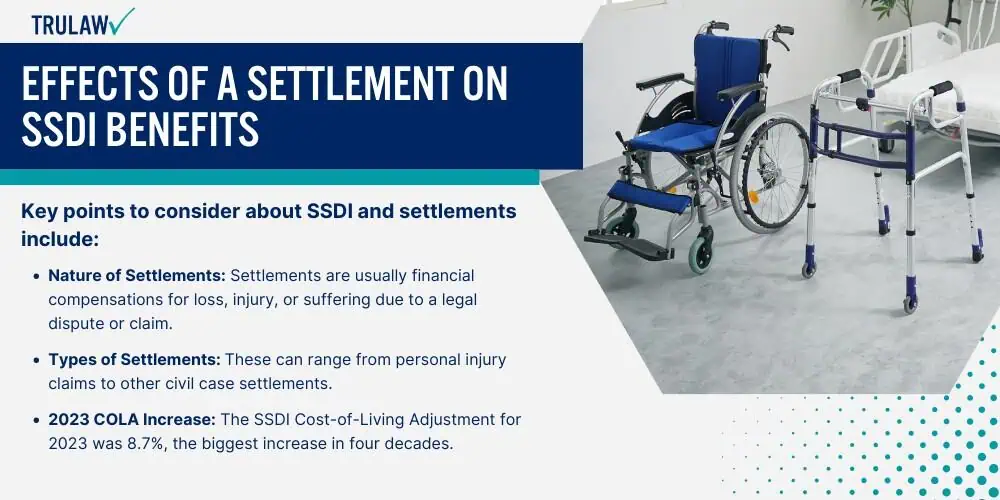
SSDI Lawsuit and Potential Settlements
SSDI is a federal program providing financial support to individuals who are unable to work due to a disability.
It’s designed to help those who have a significant work history but are now unable to earn a substantial income.
Understanding how SSDI works in conjunction with other financial settlements is crucial for maintaining eligibility and maximizing benefits.
Key points to consider about SSDI and settlements include:
- Nature of Settlements: Settlements are usually financial compensations for loss, injury, or suffering due to a legal dispute or claim.
- Types of Settlements: These can range from personal injury claims to other civil case settlements.
- 2023 COLA Increase: The SSDI Cost-of-Living Adjustment for 2023 was 8.7%, the biggest increase in four decades, affecting average benefit payouts.
If you or a loved one are filing an SSDI application or appeal, contact TruLaw today using the chat on this page to receive an instant case evaluation.
Impact of Settlements on SSDI Benefits
The interaction between settlements and SSDI benefits is complex and requires careful consideration.
Settlements can be viewed as additional income, potentially impacting the SSDI benefits one is eligible to receive.
How these settlements are structured and reported can significantly influence the SSDI benefits, making it crucial for recipients to understand these nuances.
Factors influencing the impact of settlements on SSDI include:
- Income Threshold: SSDI has specific income limits. Receipt of a settlement may be seen as income, affecting these limits.
- Legal Designation of Settlement: The purpose of the settlement (e.g., lost wages, pain and suffering) determines its impact on SSDI.
- Reporting Requirements: Beneficiaries must report any settlement to the Social Security Administration (SSA).
- 2023 Income Limits: The monthly pre-tax income limit increased to $1,470, and the SGA limit for blind individuals rose to $2,460.
Strategies to Minimize Impact on SSDI
There are strategies to reduce the impact of settlements on SSDI benefits.
These approaches involve careful financial planning and legal insight to align with SSDI regulations.
By choosing the right strategy, SSDI beneficiaries can mitigate potential reductions in their benefits.
The following strategies aim to minimize the impact on SSDI benefits:
- Structured Settlements: Opting for periodic payments over a lump sum can minimize the impact on SSDI benefits.
- Legal Advice: Consult with an attorney using the chat on this page to contact TruLaw and structure your settlement in a way that minimizes its effect on SSDI.
- Reporting and Compliance: Ensuring compliance with all SSA reporting requirements to avoid penalties or benefit suspension.
- Max Taxable Earnings Increase: The 2023 increase in maximum taxable earnings to $160,200 is essential for financial planning.
The SSDI lawsuit requires knowledge of both SSDI rules and the nature of various settlements.
Being informed and proactive in managing settlements can significantly affect one’s financial well-being and continuity of SSDI benefits, particularly in light of the recent updates in 2023.
Workers’ Compensation Settlements and SSDI
Workers’ compensation settlements and Social Security Disability Insurance (SSDI) are two important aspects of financial support for individuals who are unable to work due to injuries or disabilities.
Workers’ Compensation
Workers’ compensation is a type of insurance that provides financial benefits to employees who suffer job-related injuries or illnesses.
These workers’ compensation benefits typically cover:
- Medical expenses
- Rehabilitation costs
- Portions of lost wages.
When an employee accepts a workers’ compensation settlement, they usually receive a lump sum or structured payments over time.
Social Security Disability Insurance (SSDI)
SSDI, on the other hand, is a federal program that offers financial assistance to individuals with disabilities that prevent them from working.
To qualify for the SSDI lawsuit, the disability must be expected to last at least one year or result in death, and the individual must have a sufficient work history, as the program is funded through payroll taxes.
Interaction Between Workers’ Compensation and SSDI
The relationship between workers’ compensation settlements and SSDI is significant because receiving one can affect the other.
Specifically, if you are receiving SSDI benefits, a workers’ compensation settlement might reduce the SSDI payments.
This is because the Social Security Administration (SSA) may adjust SSDI benefits to ensure that the combined income from SSDI and workers’ compensation does not exceed a certain percentage of the individual’s average current earnings before they become disabled.
To minimize the impact of a workers’ compensation settlement on SSDI benefits, it’s important to structure the settlement carefully.
One common strategy is to spread the workers’ compensation settlement over the expected lifetime of the individual in the form of periodic payments rather than taking a lump sum.
Impact of Workers’ Compensation Settlements on SSDI Benefits
The following impacts include, but are not limited to:
- No Automatic Effect: Receiving a workers’ compensation settlement doesn’t automatically affect SSDI payments.
- 80% Threshold: If the combined income from both workers’ compensation and SSDI exceeds 80% of the average income earned before disability, reductions may occur in SSDI or the settlement amount to keep the income below this threshold.
- SSA Assessment: The Social Security Administration (SSA) evaluates workers’ compensation benefits to determine their source and the amount covering lost wages.
- Reduction Conditions: A reduction in SSDI benefits happens when the sum of the workers’ compensation settlement and SSDI payments surpasses 80% of the person’s average current earnings before disability.
- Settlement Types: This impact applies whether the workers’ compensation is received in installments or as a lump sum.
- SSA’s Offset Formula: The SSA uses a specific formula to offset the total amount received from both workers’ comp settlement and SSDI benefits if it exceeds their established threshold.
It’s important for individuals receiving both types of benefits to understand these dynamics, as they can significantly affect the total financial support available.
Consulting with a legal expert is advisable for personalized guidance and to optimize benefit arrangements.
If you or a loved one are filing an SSDI application or appeal, contact TruLaw today using the chat on this page to receive an instant case evaluation.
Long-Term Disability Lump Sum Settlements
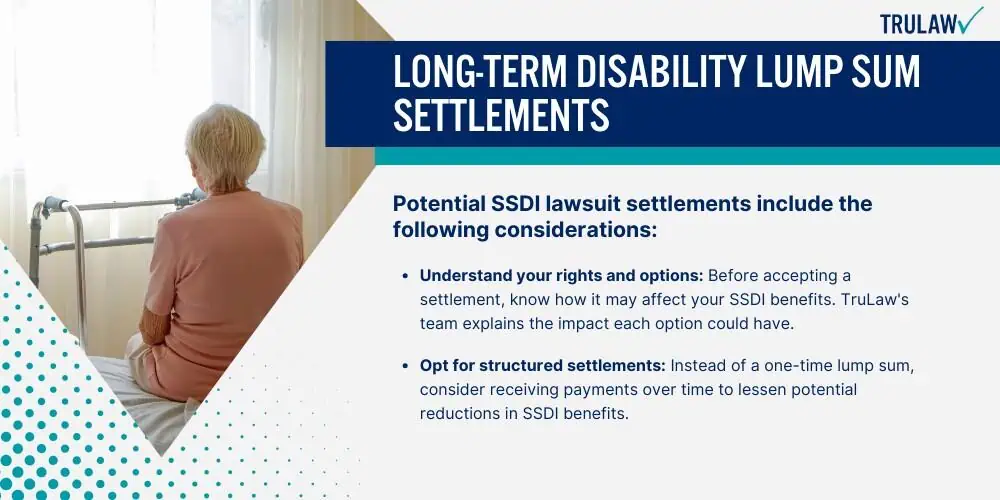
Effectively managing long-term disability and lump sum settlements is essential to protect your SSDI benefits.
SSDI Lawsuit: Structuring Settlements That Maximize Benefits
TruLaw’s expertise in the structuring of these settlements ensures clients maximize their entitlements without jeopardizing future financial security.
Potential SSDI lawsuit settlements include the following considerations:
- Understand your rights and options: Before accepting a settlement, know how it may affect your SSDI benefits. TruLaw’s team explains the impact each option could have.
- Opt for structured settlements: Instead of a one-time lump sum, consider receiving payments over time to lessen potential reductions in SSDI benefits.
- Seek professional advice: Consult with an SSDI attorney from TruLaw who can guide you through the process of structuring your settlement correctly.
- Analyze the details: Each case is unique; therefore, it’s essential to review the specifics of your situation with an expert to determine the best strategy.
- Protect SSI benefits: If you’re also receiving Supplemental Security Income (SSI), ensure your settlement is structured in a way that won’t compromise these needs-based program funds.
- Review tax implications: Settlements can have tax consequences. A lawyer will help you understand and plan for any potential liabilities.
- Prepare strong medical evidence: Solid proof of disability is vital. This evidence influences the entire settlement process and future benefits.
- Plan for future expenses: Consider long-term financial needs, including healthcare costs, when structuring your settlement with legal assistance from TruLaw.
- Maintain eligibility parameters: Stay within the income limits required for continued SSDI benefit eligibility by strategically planning your settlement disbursements.
- Adjust for cost-of-living increases: Ensure that future payments account for inflation; this is something TruLaw lawyers regularly negotiate.
Protecting your SSDI benefits
Understanding the fine print of workers’ compensation settlements and personal injury agreements is critical to maintaining your SSDI benefits.
If a settlement isn’t structured correctly, you could face a reduction in your monthly SSDI payments or jeopardize your eligibility for supplemental security income (SSI).
Keeping track of how total settlement amounts interact with your disability benefits is an ongoing responsibility.
If you or a loved one are filing an SSDI application or appeal, contact TruLaw today using the chat on this page to receive an instant case evaluation.
They employ smart strategies so that the amount received in compensation complements rather than compromises one’s financial stability related to disability resources like SSDI and SSI.
Class Action Settlement (Padro et al. v. Colvin)
The Padro et al. v. Colvin case was pivotal in reshaping policy and practice for Social Security Disability Insurance (SSDI) claims.
Important SSDI Lawsuit information and updates
This case highlighted the crucial issue of alleged bias by certain administrative law judges, which potentially influenced the outcome of disability benefit claims.
It’s essential for those receiving SSDI or contemplating legal action to stay informed about such updates, as they could dramatically affect current and future benefits.
Keeping track of these developments helps ensure that individuals understand their rights within the Social Security system and any potential adjustments to their benefits following a settlement.
Class Action Settlements on SSDI Benefits
Class action settlements play a crucial role in correcting systemic issues with SSDI benefits distribution.
Cases like “Padro et al. v. Colvin” highlight how claimants can join forces to challenge unfair treatment and secure their rights to proper compensation.
These lawsuits push for the reform of evaluation processes, aiming to provide fair and equal consideration for those with mental health disabilities.
Claimants who have been wrongfully denied SSDI benefits often find relief through class actions that force policy changes and ensure just outcomes.
Settlements from such actions not only yield individual back payments but can also set precedents, leading to more transparent procedures for future claimants, and maintaining the integrity of disability evaluations across the board.
Social Security Administration in Federal Court
Expert legal guidance is necessary to manage the complex web of Social Security Disability Insurance and ensure proper representation throughout all stages of your case.
When matters escalate beyond initial appeals, bringing a lawsuit against the Social Security Administration (SSA) in federal court embodies a critical juncture for claimants seeking justice.
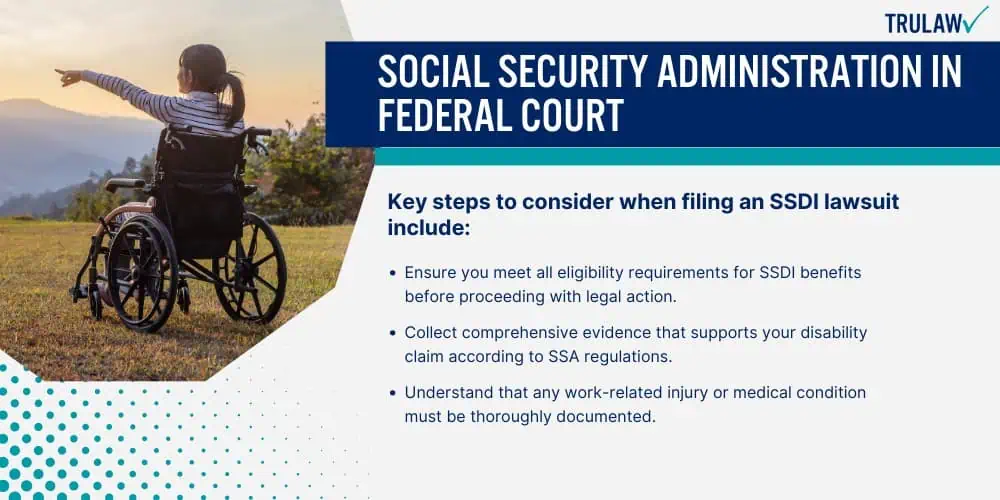
The intricacies of federal litigation demand a lawyer who can deftly interpret nuanced legal standards while aggressively advocating for your entitlements.
Considerations When Filing a SSDI Lawsuit
Filing for a SSDI lawsuit requires careful planning and attention to detail.
Professional SSDI lawyers, like those from TruLaw, can guide you through the process efficiently.
Key steps to consider when filing an SSDI lawsuit include:
- Ensure you meet all eligibility requirements for SSDI benefits before proceeding with legal action.
- Collect comprehensive evidence that supports your disability claim according to SSA regulations.
- Understand that any work-related injury or medical condition must be thoroughly documented.
- Get familiar with the potential impact a lawsuit settlement may have on existing SSDI payments.
- Be aware that an SSDI lawsuit might influence your ability to receive supplemental security income (SSI) if it’s a needs-based program you’re enrolled in.
- Calculate attorney fees as part of your overall financial considerations when seeking professional representation.
- Determine how any workers’ compensation benefits or settlements could affect the outcome of your case.
- Recognize the importance of correctly structuring long-term disability lump sum settlements to protect ongoing benefits.
- Learn about previous cases similar to yours, especially those pertaining to class actions like Padro et al. v. Colvin, for insights into potential outcomes.
- Keep updated with how a personal employment history impacts receiving SSDI benefits post-settlement.
- Acknowledge the right to appeal any decision made by Social Security regarding benefit entitlement or eligibility.
- Prepare for possible negotiations and appeal processes which may follow an initial denial of benefits.
Concluding Thoughts on the SSDI Lawsuit
Social Security Disability Insurance (SSDI) landscape has significantly developed in 2023.
The SSDI lawsuit addresses systemic issues within the SSDI system and can lead to substantial changes in policies and practices.
Contact TruLaw Today
Facing the intricacies of Social Security Disability Insurance alone can feel overwhelming, but you don’t have to tackle these challenges alone.
Engage with our experienced attorneys who specialize in ensuring that those who’ve suffered from work-related injuries or who are no longer able to work due to disability get the fair compensation they deserve.
Don’t let confusion about workers’ compensation settlements or worries over your employment history delay your claim any longer.
If you or a loved one are filing an SSDI application or appeal, contact TruLaw today using the chat on this page to receive an instant case evaluation.
Discover how TruLaw’s SSDI Lawyers can help you today.
Social Security Disability Insurance Frequently Asked Questions
-
The Social Security Administration (SSA) reviews your employment history, focusing on the types of jobs you performed 15 years before the onset of your disability.
This information helps the SSA understand the physical and mental toll of your previous duties.
Your eligibility for SSDI benefits can also be influenced by the number of work credits you’ve accumulated, which is based on your income and the number of years you’ve worked.
For example, in 2020, earning $1,410 was equivalent to one work credit, and typically, an applicant over the age of 31 needs a total of 20 work credits within the past 15 years to be eligible for SSDI benefits.
If you or a loved one are filing an SSDI application or appeal, contact TruLaw today using the chat on this page to receive an instant case evaluation.
-
Yes, you can establish a special needs trust after receiving compensation from an SSDI lawsuit.
This separates the settlement money, ensuring it does not affect eligibility for other benefits.
If you or a loved one are filing an SSDI application or appeal, contact TruLaw today using the chat on this page to receive an instant case evaluation.
Discover how TruLaw’s SSDI Lawyers can help you today.
-
Receiving a personal injury settlement from an SSDI lawsuit generally will not affect your existing SSDI benefits.
This is because SSDI benefits are based on your employment history and the contributions you’ve made to the Social Security trust fund via the Federal Insurance Contributions Act (FICA) tax rather than your current income or resources.
However, if you are also receiving Supplemental Security Income (SSI), a needs-based government benefit, your settlement could disrupt your SSI eligibility as there is an asset test in place for SSI.
If you or a loved one are filing an SSDI application or appeal, contact TruLaw today using the chat on this page to receive an instant case evaluation.
Discover how TruLaw’s SSDI Lawyers can help you today.
-
Receiving SSI benefits can significantly impact an SSDI lawsuit, as the Social Security Administration manages both.
If an individual is already receiving SSI benefits, it indicates acknowledgment of a disability, which could potentially support their SSDI claim.
However, the criteria for SSDI benefits differ, focusing more on past contributions to the Social Security system and specific medical qualifications.
If you or a loved one are filing an SSDI application or appeal, contact TruLaw today using the chat on this page to receive an instant case evaluation.
Discover how TruLaw’s SSDI Lawyers can help you today.
-
It is possible to appeal the decisions regarding Social Security Disability Insurance (SSDI) claims, including those related to total disability.
This process can lead to an SSDI lawsuit and/or appeal if the appeals are unsuccessful at the initial levels of the process.
The first step is to request a hearing, which can be conducted in person, by video, or by telephone.
During the hearing, witnesses can be called to provide evidence supporting the claim. If the decision from the hearing is not satisfactory, an appeal can be filed with the Appeals Council.
The final step, if the Appeals Council decision is also unsatisfactory, is to file a civil action with the U.S. District Court.
The court’s review can lead to various outcomes, including remanding the case back to the Appeals Council, reversing the decision, or upholding the decision.
If you or a loved one are filing an SSDI application or appeal, contact TruLaw today using the chat on this page to receive an instant case evaluation.
Discover how TruLaw’s SSDI Lawyers can help you today.

Managing Attorney & Owner
With over 25 years of legal experience, Jessica Paluch-Hoerman is an Illinois lawyer, a CPA, and a mother of three. She spent the first decade of her career working as an international tax attorney at Deloitte.
In 2009, Jessie co-founded her own law firm with her husband – which has scaled to over 30 employees since its conception.
In 2016, Jessie founded TruLaw, which allows her to collaborate with attorneys and legal experts across the United States on a daily basis. This hypervaluable network of experts is what enables her to share the most reliable, accurate, and up-to-date legal information with our readers!
Additional Social Security Disability Insurance resources on our website:
Here, at TruLaw, we’re committed to helping victims get the justice they deserve.
Alongside our partner law firms, we have successfully collected over $3 Billion in verdicts and settlements on behalf of injured individuals.
Would you like our help?
At TruLaw, we fiercely combat corporations that endanger individuals’ well-being. If you’ve suffered injuries and believe these well-funded entities should be held accountable, we’re here for you.
With TruLaw, you gain access to successful and seasoned lawyers who maximize your chances of success. Our lawyers invest in you—they do not receive a dime until your lawsuit reaches a successful resolution!
AFFF Lawsuit claims are being filed against manufacturers of aqueous film-forming foam (AFFF), commonly used in firefighting.
Claims allege that companies such as 3M, DuPont, and Tyco Fire Products failed to adequately warn users about the potential dangers of AFFF exposure — including increased risks of various cancers and diseases.
Depo Provera Lawsuit claims are being filed by individuals who allege they developed meningioma (a type of brain tumor) after receiving Depo-Provera birth control injections.
A 2024 study found that women using Depo-Provera for at least 1 year are five times more likely to develop meningioma brain tumors compared to those not using the drug.
Suboxone Tooth Decay Lawsuit claims are being filed against Indivior, the manufacturer of Suboxone, a medication used to treat opioid addiction.
Claims allege that Indivior failed to adequately warn users about the potential dangers of severe tooth decay and dental injuries associated with Suboxone’s sublingual film version.
Social Media Harm Lawsuits are being filed against social media companies for allegedly causing mental health issues in children and teens.
Claims allege that companies like Meta, Google, ByteDance, and Snap designed addictive platforms that led to anxiety, depression, and other mental health issues without adequately warning users or parents.
Transvaginal Mesh Lawsuits are being filed against manufacturers of transvaginal mesh products used to treat pelvic organ prolapse (POP) and stress urinary incontinence (SUI).
Claims allege that companies like Ethicon, C.R. Bard, and Boston Scientific failed to adequately warn about potential dangers — including erosion, pain, and infection.
Bair Hugger Warming Blanket Lawsuits involve claims against 3M — alleging their surgical warming blankets caused severe infections and complications (particularly in hip and knee replacement surgeries).
Plaintiffs claim 3M failed to warn about potential risks — despite knowing about increased risk of deep joint infections since 2011.
Baby Formula NEC Lawsuit claims are being filed against manufacturers of cow’s milk-based baby formula products.
Claims allege that companies like Abbott Laboratories (Similac) and Mead Johnson & Company (Enfamil) failed to warn about the increased risk of necrotizing enterocolitis (NEC) in premature infants.
Here, at TruLaw, we’re committed to helping victims get the justice they deserve.
Alongside our partner law firms, we have successfully collected over $3 Billion in verdicts and settlements on behalf of injured individuals.
Would you like our help?

